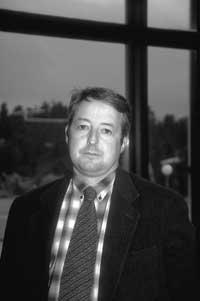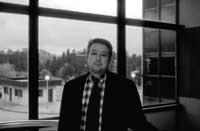Unai Ugalde: “We have an immature and young system”
Unai asked us for time. Have you had enough? Do you already see yourself Director of Scientific Policy?
Well, although scientific policy is complex in itself, I already knew from another point of view scientific policy, as user and as scientist. Therefore, this season I have been immersed in an adaptation process. Consequently, I can say that I am now able to make some ideas and opinions known. And, looking forward, I know that I will have a lot of work for everyone in the provision and promotion of our scientific policy and our scientific system.
The first are steps of adaptation and updating, but as you have so far been dean of the Faculty of Chemistry, it is not the first time you have held positions of responsibility.
No, five years ago I started working as a decanate and there I started to devote myself a little to scientific policy. Then I was dean for two years and three months ago I was appointed Director of Scientific Policy, so I am working in a wider field, but with friends I had before, and I wanted to work things like that.
We're talking about the Directorate of Scientific Policy, but what is that science and policy cocktail?

I would cite mainly three tasks. First of all it is a work of planning, doing science is not a work that is generated from one day to another, but it must be planned. There are many resources, it is very expensive, and for the people having a direct scientific policy is strategically very important. Therefore, the first job is in planning: to see what resources we have, what strengths we have, what shortages we have… and in that sense, to properly guide resources.
It is about promoting a second task, that is to say, although in the Autonomous Community of the Basque Country there is no state competition today, there are no economic resources… The Basque Government in the last 18 years has made a great effort to promote science and technology, and one of our tasks is to promote. We have to make concrete decisions to move science from one side to the other.
Finally, I would mention the need to expand relations. Science, like art and other things, is a work without borders. Scientists are not from one country or another, they are from all over the world, they are arranged together and we have to help Basque scientists to contact others. With these three things I would summarize the role of the Directorate of Scientific Policy.
It has been three months since he took the new post. How has Unai seen in this season the situation of science in the Basque Country?
Well, more or less similar to what I saw before, but much more exactly. On the one hand I have seen an immature and young system. In Euskal Herria we have started to do science with seriousness and resources in the last 15 years. This time is very short and therefore it is not mature.
On the other hand, the planning of the scientific policy or system we have has not been ours, but that which has been carried out on the basis of schemes that have come from outside us, and our scientific system has not yet adapted to our needs. As a young man, it is also small: officially in the Basque Country 4 out of 1,000 inhabitants are dedicated to science, they are scientists. However, I think these are not real data, in practice I would say that scientists are only 2 of 1,000. In nearby locations such as France, England or Germany are more than 7. With this I mean that we still have few scientists.
From another point of view, which is young and small, I think it is also a promising, vigorous future. The average percentage destined for research in our Gross Domestic Product is 1.24%, while that of Europe is 1.8%. If it is compared with the State, we must say that we are above, even if there is no transfer or competition.
The issue of transfers is there on the table, and it has also been news the denial of the transfer of competencies of the investigations. How can you evaluate?
On May 12, Counselor Oliveri held a conversation with Mr.Rajoy, reaching a certain consensus: from now on talks will begin through cooperation to open up a transfer channel. Based on this, from now on, the details will be analyzed and the negotiations will begin, in which it is considered that the Basque Country will acquire the rights that correspond to it. If necessary it will not be in a single blow, but from now on we will have the task of channeling it.
How can you work for science and technology if there are no resources?
Well, there are many types of resources. One of them is the people, that is, the imagination, the enthusiasm… and without that the money does not serve at all. That is our biggest asset, the people. Another type would be the education system, because without a good education we will not have adequate people. And then there are the rest of resources, Euskal Herria has its own, although it does not collect the amount it gives to the State through the corresponding quota. But it is true that funds are received from the European Union and that there is a certain participation in open programs, although below what we wanted.
What do you think is or at least should be the mirror of science in the Autonomous Community of the Basque Country? Madrid or Europe?

I think you really can't say one or the other. As I said, the scientific system has no limitation. Historiaz Hego Euskal Herria has been integrated into the Spanish state and has maintained an intense relationship with the university and the industrial system. Here, apart from the administration, it is related to different researchers, centers and systems.
On the other hand, our travel companions, from the north, are those who really have the most developed systems in Europe, which are those that form the platoon that we must follow. It is clear, however, that relations have to be with both, because they provide some performance and favor development for both parties. Therefore, there is no exclusion.
Science and politics, a rather rare cocktail. What is more in the Directorate of Scientific, Scientific or Political Policy?
I'm actually a scientist, but now I have to work in politics. Before answering directly to your question I would like to say that the scientific system is a public good to be organized. To organize it, on the one hand, politicians are needed – now the transfer problem is addressed by politicians, for example – administrators — to properly manage resources and channel them professionally — technicians — to help scientists in the laboratory — and, of course, scientists. In the end, this collective, although each one has its own particular objectives, meets to fulfill the public objective. These public objectives—science, art, culture…—are part of the public heritage. Therefore, all types of professionals are needed to promote a balanced research system.
What will I do more, politics or science? It is clear that I will have to make politics, even if it is not my basic profession, but I will make it happy, because I believe that at this moment it is the best service, which will be a work in favor of science and society of Euskal Herria.
Buletina
Bidali zure helbide elektronikoa eta jaso asteroko buletina zure sarrera-ontzian











